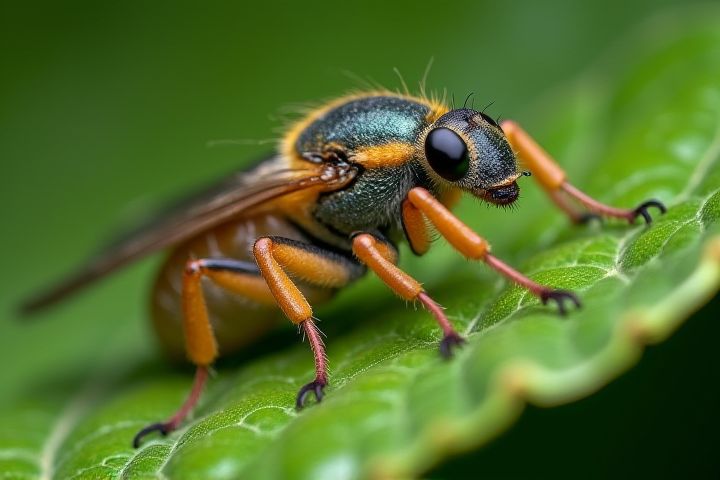
Nigeria boasts a rich biodiversity, consisting of diverse ecosystems such as rainforests, savannahs, and wetlands. Home to numerous species, the country has over 15,000 plant species and a variety of animals, including endangered species like the Cross River gorilla and African manatee. The Niger Delta, a crucial ecological zone, provides habitats for unique wildlife, while the country's national parks, such as Yankari and Gashaka-Gumti, protect these valuable resources. Conservation efforts are essential to address threats from deforestation, pollution, and habitat loss. Engaging in sustainable practices can help maintain Nigeria's biodiversity for future generations.
Rich ecosystems variety
Nigeria boasts a rich tapestry of biodiversity, featuring diverse ecosystems such as tropical rainforests, savannas, and wetlands. Home to over 15,000 known plant species and thousands of animal species, these ecosystems support countless unique wildlife, including endangered species like the Cross River gorilla and the African manatee. The Niger River and its delta provide vital habitats for various aquatic life, while the country's national parks like Yankari and Gashaka gumti protect critical flora and fauna. Understanding and conserving this biodiversity is essential for maintaining environmental balance and supporting livelihoods in local communities.
Endangered species presence
Nigeria's rich biodiversity includes a significant number of endangered species, such as the Cross River gorilla and the African elephant, which are threatened by habitat loss and poaching. The country's diverse ecosystems, including rainforests, savannas, and wetlands, provide critical habitats for these at-risk species. Conservation efforts are underway, involving local communities and international organizations, to protect these species through habitat preservation and anti-poaching initiatives. You can support these efforts by raising awareness and participating in conservation programs aimed at safeguarding Nigeria's unique wildlife.
Diverse flora and fauna
Nigeria boasts an impressive array of biodiversity, housing over 15,000 species of flowering plants, 1,000 species of birds, and numerous endemic mammal species. The country's lush tropical rainforests, savannahs, and wetlands serve as vital habitats for diverse species, including the critically endangered Cross River gorilla and the Nigerian-Congo forest elephant. Protecting these ecosystems is crucial for maintaining ecological balance, as they provide essential resources such as food, medicine, and clean water. Engaging in conservation efforts not only preserves rich biodiversity but also enhances your connection to nature and supports sustainable practices in local communities.
Vital agricultural resources
Nigeria's biodiversity encompasses a rich variety of agricultural resources that play a crucial role in food security and economic sustainability. With over 1,000 indigenous plant species, including cash crops such as cocoa, palm oil, and groundnuts, the country sustains a diverse agricultural ecosystem. Livestock farming, particularly cattle, goats, and sheep, contributes significantly to both rural livelihoods and national protein supply. By promoting sustainable agricultural practices, you can help preserve this biodiversity while enhancing the resilience of Nigeria's food systems.
Forest cover reduction
Nigeria's biodiversity is severely impacted by the ongoing reduction of forest cover, which is driven largely by deforestation for agricultural expansion, logging, and urbanization. This loss of forests threatens the unique ecosystems that support a wealth of flora and fauna, some of which are endemic to the region. The decline in tree cover not only disrupts wildlife habitats but also exacerbates climate change by reducing carbon sequestration capabilities. Conserving and restoring Nigeria's forests is crucial for maintaining ecological balance, supporting local communities, and preserving the nation's rich natural heritage.
Wetlands ecological importance
Nigeria's wetlands, such as the Niger Delta and the Hadejia-Nguru wetlands, are crucial for supporting biodiversity and ecosystem services. These areas are home to a plethora of species, including fish, birds, and aquatic plants, providing critical habitats for both resident and migratory wildlife. Wetlands play a vital role in water filtration, flood control, and carbon sequestration, contributing to the overall health of the environment. Protecting these ecosystems is essential for sustaining local communities and their livelihoods, emphasizing the need for responsible management and conservation strategies.
Conservation efforts challenges
Nigeria is home to an incredibly diverse range of flora and fauna, but biodiversity faces significant threats from deforestation, habitat destruction, and climate change. Conservation efforts are hindered by inadequate funding, lack of awareness among local populations, and insufficient governmental policies aimed at protecting endangered species. Organizations like the Nigerian Conservation Foundation work tirelessly to promote sustainable practices and engage communities in conservation initiatives. You can support these efforts by contributing to awareness campaigns and participating in local conservation activities that help preserve Nigeria's rich natural heritage.
National parks significance
Nigeria's national parks play a crucial role in preserving biodiversity, serving as habitats for a wide array of flora and fauna, including endangered species. These protected areas, such as Yankari National Park and Cross River National Park, feature diverse ecosystems ranging from savannah to rainforest, which are essential for ecological balance. The conservation efforts within these parks not only protect wildlife but also promote sustainable tourism, benefiting local communities economically. By visiting these national parks, you contribute to the preservation of Nigeria's rich natural heritage and support initiatives aimed at wildlife conservation.
Invasive species threat
Biodiversity in Nigeria faces significant threats from invasive species, which disrupt local ecosystems and outcompete native flora and fauna. Key invasive species such as the water hyacinth and giant snail have been documented for their rapid expansion, leading to reduced habitat availability for indigenous wildlife. These non-native species not only affect agriculture and fisheries but also threaten the livelihoods of communities reliant on these resources. As you navigate Nigeria's rich natural heritage, understanding the impact of invasive species underscores the importance of conservation efforts and responsible environmental stewardship.
Climate change impact
Biodiversity in Nigeria is significantly affected by climate change, leading to shifts in habitat and species distribution. Rising temperatures and altered precipitation patterns threaten ecosystems, endangering native wildlife and plant species crucial for ecological balance. The degradation of natural habitats due to climate fluctuations exacerbates the risk of extinction for many endemic species, disrupting local food chains. Understanding these impacts is vital for conservation efforts, as your awareness can contribute to the preservation of Nigeria's rich but vulnerable biodiversity.
